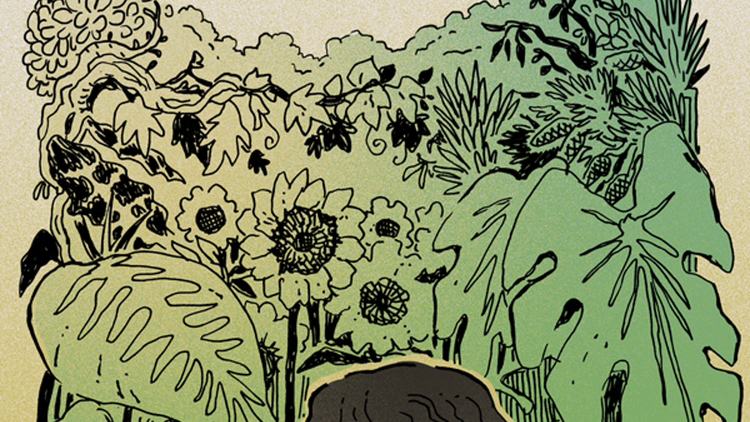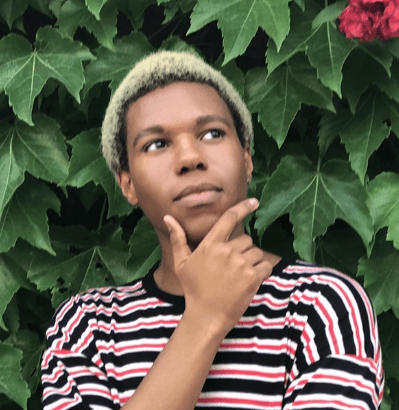Exclusive Preview: WEIRD FISHES
An Underwater Tale of Friendship Against Monstrous Odds
When Ceph, a squid-like scientist, discovers proof of the ocean’s slowing currents, she makes the dangerous ascent from her deep-sea civilization to the uncharted surface above. Out of her depths and helpless in her symbiotic mech suit, Ceph relies on Iliokai, a seal-folk storyteller, who sings the state of the sea and has seen evidence of clogged currents as she surfs the time gyres throughout the lonely blue. Navigating the perils of their damaged ocean environment, and seemingly insurmountable cultural differences, Ceph and Iliokai realize that the activities of terrestrial beings are slowing the spiralling currents of time. On a journey that connects future and past, the surface and the deep, the unlikely friends struggle to solve a problem so big it needs a leviathan solution.
This stunning cover is by Julia Louise Pereira. Check out more of her work here.
Weird Fishes will be available in August 2022. Pre-order Weird Fishes here! Keep reading to see what the author and editor have to say about the book, plus an exclusive excerpt.
Rae Mariz is a speculative fiction storyteller and cultural critic. Her writing inhabits the ecotone between science fiction and fantasy, and features characters finding family with others who live in the gaps between. She’s the author of The Unidentified and co-founder of Toxoplasma Press. Find her work at raemariz.com and on Twitter @raemariz.
Looking at the cover, I keep thinking about how a book is the opening between two worlds. Writers are supposed to accept that a book is an object of commerce—units moved—but don’t be fooled; Stelliform has helped me shape an interdimensional portal. Whatever the boundary is between this fucking place and that expansive story-world, it will be this deceptively small, novella-shaped hole that a reader squeezes through to get there.
I’m excited about readers taking the plunge even though there’s no way we can prepare them for how deep this story goes. We can only hint at the buoyant delights and chemical emotions swirling on the other side. After readers reemerge, I hope they feel a gentle tentacle tug still connecting them to that place. And maybe reconsider what exactly is separating us from the world we live in and the ones we can imagine.
Stelliform Press Publisher & Editor Selena Middleton is also excited to share this book with the world:
Asked to say a few words about this book, I find my mind swirling in a kind of gyre and maybe that’s the best way to express the experience of being this book’s editor. I pulled this book out of slush and got sucked into a world that has changed me in different ways every time I engaged with it. Did I emerge from the other side of this story a different person? I do feel transformed—not just by what’s on the page but by the conversation between me and Rae and these characters and this world. I hope that readers will love stubborn little Ceph and Iliokai’s deep love and longing and everything that Rae has given us in these pages enough to be changed too.
An exclusive excerpt from Weird Fishes
It wasn’t uncommon in the open ocean for communities of young castaways to form. The same impulse that led turtle hatchlings to the sea was present in all abandoned juveniles no matter where they emerged. They were attracted to whatever they could rally around in the great blue. It was the same with Iliokai when she was a pup. She was alone at sea until she found a driftwood log wrapped in what she would later understand to be a fishing net that ensnarled floating plastic waste, and, at times, her fellow trash siblings.
Iliokai took special care to free her friends as best she could with her prehensile flippers and carnivore teeth. She grew up alongside a baby leatherback turtle, a real sweet kid. A school of young puffer fish. Got a few nibbles from an adolescent silky shark who was still learning what tasted good; she made sure he got the thorough education that whale riders did not. She grazed barnacles and seaweed that collected in their drift. Protected her clan from seabirds. Submerged herself in the underwater songs when the glare off the endless surface felt too lonely.
Her driftwood siblings grew and moved on eventually, following the songs of the sea since they couldn’t sing any of their own. They dove to the deep to spawn, or returned to ancestral shores. Followed impulses to return to where they came from, mostly. Iliokai didn’t feel that impulse toward a home. She never understood why whale riders, in many ways similar to other marine mammals, never cared for their young like seals and otters and whales. Why her lot in life was to drift the desert blue searching for families who, sure, embraced her for a time, but couldn’t ever really fill the missing. Weren’t able to replace her first memory of life, drifting small and alone.
A family of pilot whales were the first to adopt her when her trash raft was home only to herself and an uncommonly amusing gull. Pilot whales lived in extremely close-knit families, and Iliokai basked in the affections of her uncles and aunties, shared in the joy of her sister being born. Iliokai raced her sister and accepted gifts of whale milk from her adoptive mother in exchange for her fawning pup songs. At that young age, she could only hum contented melodies. She was still learning to find her voice.
Then her sister sickened and died. The shock and the sorrow unlocked her jaw. Grief tore the first song from her body. She found her voice and it was raw and rough. Devastating.
gather your poisons in my body
lace them sweetly in my milk
feed my baby with your horrors
’til her body falls to silt
follow me to the shore
smash my body to the sand
follow me to the shore
sorrows you can’t understand
Partly from heartbreak, partly from fear of poisoning another with her milk, Iliokai’s first real mother pushed her away. Then she and her aunties and uncles beached themselves in grief.
This was a song Iliokai would sing many times. Mothers’ mourning filled the seas more than salt. Refugee walruses unable to find ice to rest their weary young. The tale of Tahlequah, the orca mother who carried her dead calf for seventeen days in her grief and outrage, parading the dead uselessly to the ones from Above. Iliokai hated to tell it, but these stories fell on her to be told. She was a whale rider; her breed of seafolk had to sing what they witnessed. It was their instinct. Like a shark’s impulse to bite and thrash. Like an oyster’s pain shapes a pearl.
Not many knew the connection between the whale riders and their songs. As if those songs belonged to them, as if they had any control in their creation. A sea song was born of an intense emotion — an unimaginable trauma or an overwhelming joy — that unhinged a jaw and allowed release through the body. This was why singing wasn’t an accurate description. Something closer to childbirth could describe the euphoric agony, the body’s automatic convulsions that expel the song into the world. Maybe it wasn’t much of a surprise then, that whale riders neglected to care for their young. Hope and sorrow were always meant to be released into the sea, to travel where they would. If there was an impulse to comfort and care for a song, Iliokai’s kind didn’t act on it. Whale riders were expected to just let them go.
Pre-order Weird Fishes today! In the meantime, care for yourself and the people around you. Believe that the world can be better than it is now. Never give up.
—Gailey


![Guest Host [sarah] Cavar](/content/images/size/w750/2025/03/COVER---Failure-to-Comply.jpg)



Member discussion